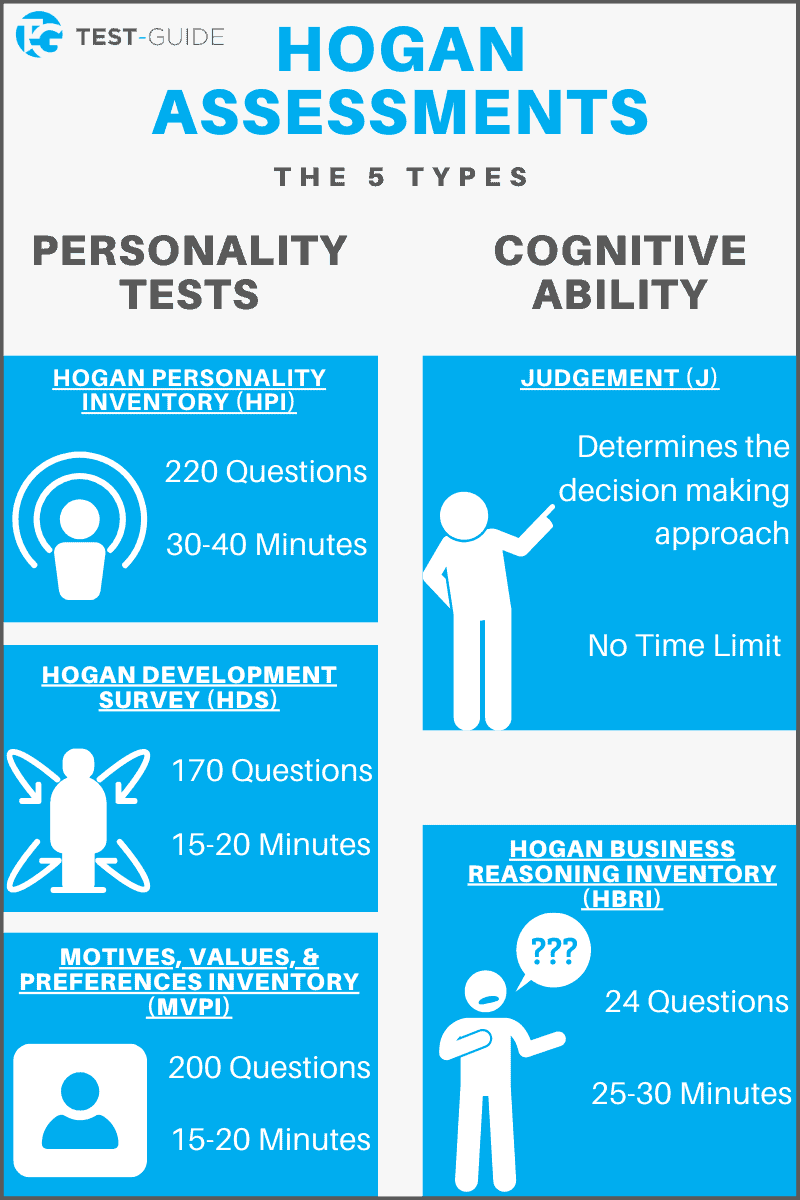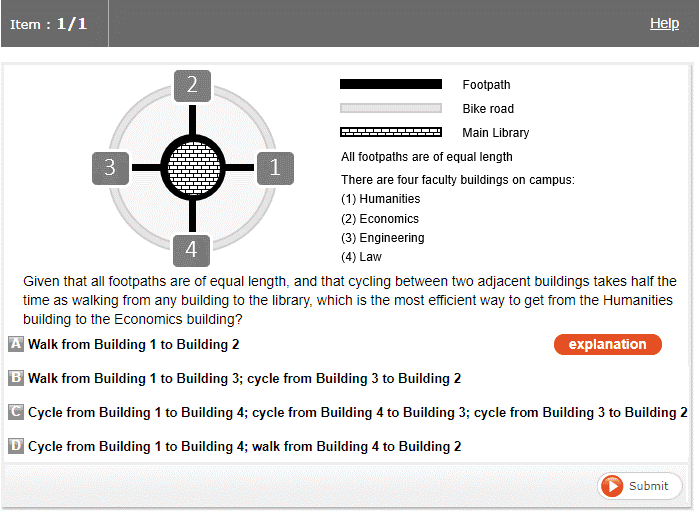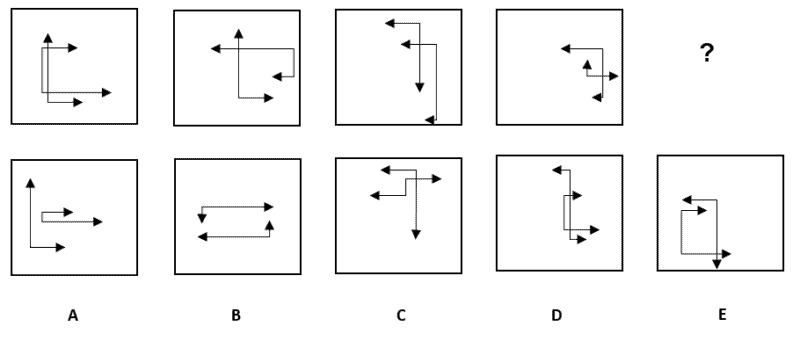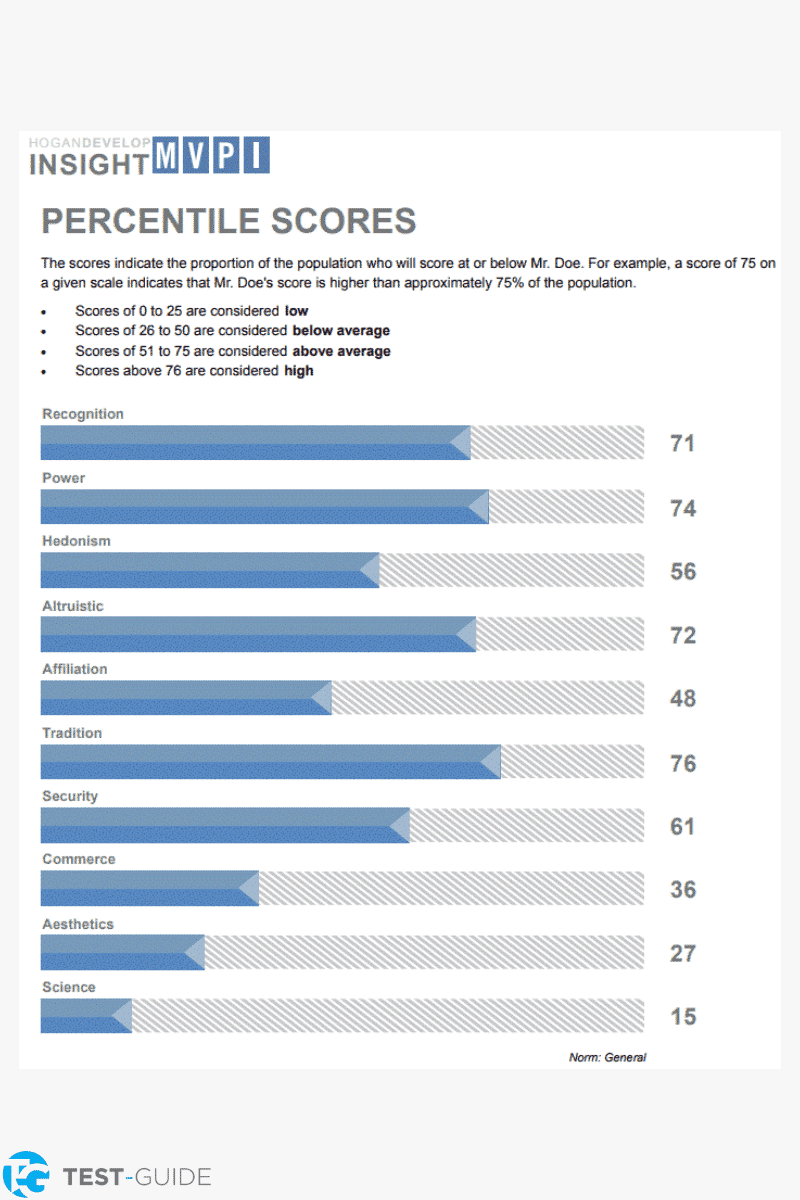The Hogan assessment is a test used by employers to see if someone is a good fit for the position they are hiring for.
The exam was founded in 1987 by Joyce and Robert Hogan. Since 1987, the exam has been administered to 11+ million people and is used by Fortune 500 companies around the world.
Types of Hogan Assessments
There are 5 different types of Hogan assessments. They are split into 3 different personality assessments and 2 different cognitive ability assessments.
Hogan Personality Assessments
- Hogan Personality Inventory (HPI)
- Hogan Development Survey (HDS)
- Motives, Values, and Preferences Inventory (MVPI)
Hogan Cognitive Ability Assessments
- Hogan Judgment Test (HJT)
- Hogan Business Reasoning Inventory (HBRI)
You may take all 5 of these assessments or a various combination of them. Your employer will choose. Please note, this exam is not an intelligence test. If you want to prepare for an intelligence test, take our IQ test online.
Overview of Each Hogan Assessment
Each exam is given separately. The specific exams you will take are determined by your employer. You may not be required to take all 5 assessments.

| Test | Completion Time (Mins) | Questions | Purpose | Predicts |
|---|---|---|---|---|
| HPI (Personality) | 15-20 | 220 | Describes normal personality qualities | How people work |
| HDS (Personality) | 15-20 | 170 | Uncover blind spots that could lead to career derailment | Personality-based performance risks |
| MVPI (Personality) | 15-20 | 200 | Assess fit between values | Success & job satisfaction |
| HJT (Cognitive Ability) | Not timed | Varies | Determine the decision-making approach & reaction to feedback | Individual’s ability to learn from feedback |
| HBRI (Cognitive Ability) | 30 | 24 | Identify an individual’s problem-solving style and areas that need improvement | Job performance |
Hogan Personality Inventory (HPI)
Fast Facts:
- Questions: 220
- Time Limit: No time limit, but typically takes 15-20 minutes.
The Hogan personality inventory test assesses how you relate to others daily. Employers use this to determine if you work well with others. It will measure your day-to-day personality.
This assessment is composed of 7 “primary scales” (bright side personality traits):
- Adjustment: Measures a person’s self-confidence, self-esteem, and working under pressure.
- Ambition: Measures a person’s desire to lead, their initiative, and their competitiveness.
- Sociability: Measures a person’s need for social interaction and extrovert tendencies.
- Interpersonal Sensitivity: Measures a person’s likability, their tact, and their ability to maintain relationships.
- Prudence: Measures a person’s responsibility, self-discipline, and the ability to be thorough.
- Inquisitiveness: Measures a person’s imagination and curiosity.
- Learning Approach: Measures a person’s enjoyment of learning and ambition to keep up with current knowledge.
You will work through a series of statements, with which you will strongly disagree, disagree, agree, or strongly agree (Likert scale).
Example
After being alone for a while, I really feel the need to be with other people.
- Strongly Agree, Agree, Disagree, or Strongly Disagree.
For more information, visit the official website.
Hogan Development Survey (HDS)
Fast Facts:
- Questions: 170
- Time Limit: No time limit, but typically takes 15-20 minutes.
The Hogan development survey evaluates how an individual manages relationships and issues in times of crisis. Employers use this to determine whether your behavior in an emergency would harm work performance and social interactions. Would it be a risk to the company?
This assessment is composed of 11 “personality scales”:
- Excitable: Measures a person’s ability to work with passion and enthusiasm, and their tendency to be easily frustrated, moody, irritable, or give up on projects or people.
- Skeptical: Measures a person’s tendency to be alert for deceptive behavior in others and take action when it is detected.
- Cautious: Measures risk aversion, fear of failure, and avoiding criticism.
- Reserved: Measures seeming harsh, aloof, remote, and unconcerned with the feelings of others.
- Leisurely: Measures how a person appears to be friendly and cooperative, but following one’s agenda and quietly stubbornly resisting others.
- Bold: Measures seeming fearless, confident, and self-assured, always expecting to succeed and unable to admit mistakes or learn from experience.
- Mischievous: Measures impulsiveness, adventurousness, and risk-seeking.
- Colorful: Measures gregariousness, fun, entertaining, and enjoying being in the spotlight.
- Imaginative: Measures innovation, creativity, possibly eccentric, and self-absorbed.
- Diligent: Measures being hardworking, detail-oriented, and having high standards of performance for self and others.
- Dutiful: Measures being compliant, conforming, and eager to please others.
You will read through a series of statements and determine if they are True or False.
Example
Strangers quickly recognize my talent and intelligence.
- A. True
- B. False
For more information, visit the official website.
Hogan Motives, Values, Preferences Inventory Test (MVPI)
Fast Facts:
- Questions: 200
- Time Limit: No time limit, but typically takes 15-20 minutes.
The Hogan motives, values, preferences inventory assesses your core goals, drives, interests, and values. Employers use this to determine what motivates you. What position would suit you best?
This assessment is composed of 10 “primary scales”:
- Recognition: Measures a person’s responsiveness to attention, approval, and praise.
- Power: Measures the desire for success, accomplishment, status, and control.
- Hedonism: Measures a person’s orientation for fun, pleasure, and enjoyment.
- Altruistic: Measures the desire to help others and contribute to society.
- Affiliation: Measures a person’s enjoyment and preference for social interaction.
- Tradition: Measures a person’s dedication to strong personal beliefs.
- Security: Measures the need for predictability, structure, and order.
- Commerce: Measures a person’s interest in money, profits, investment, and business opportunities.
- Aesthetics: Measure the need for self-expression, concern over looks, feel, and design of work products.
- Science: Measures a person’s interest in knowledge, research, technology, and data.
You will read through a series of statements with which you will agree, disagree, or be undecided.
Example
Job security is more important than job satisfaction.
- A. Agree
- B. Disagree
- C. Undecided
For more information, visit the official website.
Hogan Business Reasoning Inventory (HBRI)
Fast Facts:
- Questions: 24
- Time Limit: 30 minutes
The Hogan business reasoning inventory test measures your tactical and strategic reasoning. Employers use this assessment to determine how you solve problems, identify gaps, flaws, and errors in written and numerical items.
There are three types of questions in this assessment:
- Verbal Reasoning & Logic: Questions such as word analogies or logic puzzles.
- Numerical Reasoning: Questions involving calculations of distance, area, or percentage based on information presented in tables, charts, or graphs.
- Abstract Thinking: Questions involving the manipulation of 2-D or 3-D figures.
Example (Verbal Reasoning & Logic):
Submarine is related to Water the same way Oil is related to
- A. Ground
- B. Industry
- C. Fire
- D. Air
- E. Flow
Example (Numerical Reasoning):

Example (Abstract Thinking):
Which blocks complete the following sequence?

These questions are very similar to the Wonderlic, you can take our Wonderlic practice test to prepare.
Hogan Judgment Assessment (HJT)
Fast Facts:
- Questions: Varies
- Time Limit: No Time Limit
The Hogan judgment assessment is a combination of the HPI, HDS, MVPI, and HBRI assessments. The judgment assessment evaluates how a person makes decisions and measures their response to the results of their decision and negative feedback.
Employers use this assessment to determine how quickly you can process complex information and its effect on your decision-making process. Can you take responsibility and accept the results, or will you push the blame onto others?
Judgment falls into three categories:
- Learning: Assesses how you prefer to learn, whether with words, images, or with numbers and symbols.
- Deciding: Assesses your decision-making process. The decision-making process is affected by our personalities, amongst many other factors, and can create bias when making decisions.
- Adapting: Assesses how you react to a good or bad decision.
For more information on either of the cognitive assessments (HBRI or HJT), visit the official website.
High Scores = New Job
Want a high score on your Hogan Assessment?
Consider our #1 recommended Hogan prep course.

Administration of the Hogan Assessment
Hogan assessments are online assessments. To complete an assessment, you will be provided with a username and password, which will allow you to access the online assessment platform.
Scoring of the Hogan Assessment
Hogan scores assessments through a combination of percentile ranking systems and normative test results. Normative scores show how you rank compared to other people who have taken the test previously.
A percentile placement score is given for each trait to indicate whether your score is low, below average, above average, or high compared to others who have previously taken the test.
There is no ideal personality or score. Employers will be looking for different personality and scores depending on the type of job or position they are hiring for. They want to hire someone who will be a good fit for the position.

Source: Hogan Insight MVPI Sample Score Report© 2013 Hogan Assessment Systems Inc.
How to Pass the Hogan Assessment
The Hogan test is a hard exam to prepare for (especially the Hogan personality tests) because the qualities and scores needed will vary from employer to employer and from position to position.
An employer may be looking for certain qualities for job A and different qualities for job B. Here are some tips to help you pass the assessment:
- Familiarize Yourself with the Position and Some Qualities the Employer is Looking For: If you can learn more about the position, you can figure out some “desirable” qualities someone may be looking for when hiring for the position. By knowing the desirable qualities, you can tailor your answers on the exam to fit those qualities.
- Familiarize Yourself with the Test and Sections You Will be Taking: It is important to know which sections of the exam you will be taking. Once you figure out which sections you will be taking, make sure you are familiar with the types of questions you will be asked on each of those sections.
- Take Practice Tests: Taking a Hogan practice exam will help you become more comfortable with the exam and types of questions you will be asked. You will feel more prepared heading into the actual exam after taking a practice exam.
Frequently Asked Questions
What are my Hogan assessments used for by my employer?
Your assessments are used for pre-hiring selection, assessing safety-related behavior, identifying high potential employees, and developing leaders.
Can I see my assessment results?
Whether or not you can see your assessment results is up to your employer.
What is a good score on the assessments?
There is no such thing as an ideal score or personality profile. Each individual’s assessment scores are likely to reveal some strengths and some potential challenges or risk factors.
An employer will be looking for a specific profile or score for each position they are hiring for.
Do a lot of companies give the Hogan test?
Since 1987, more than 11 million assessments have been given. Many Fortune 500 companies use this exam and the exam is administered in more than 50 countries.

